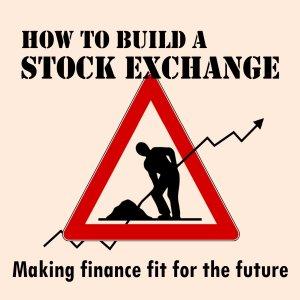How to Build a Stock Exchange

Episode 10. Where real men make real money
Stories shape our world, and stock markets are no exception. This episode explores the entanglements of fiction and finance, from Robinson Crusoe to American Psycho. We discover how Tom Wolfe cut a deal with Wall Street, making finance male, rich and white, and see how the concept of ‘smartness’ perpetuates elitism and discrimination in Wall Street recruitment. A better stock exchange is going to need a better story; in this second half of my podcast series we’ll be discovering just that.
Transcription
Imagine the financier. What does he look like? It’s going to be him, for reasons I’ll come to shortly. He’s white, of course. I wouldn’t be surprised if he has a striped shirt and braces – suspenders if you prefer – a perma-tanned face and slicked back hair. He opens his mouth, and you know what’s coming. Yes, greed is good…
It’s Gordon Gekko, a face and a speech burned into our collective imaginings of finance by Michael Douglas’ spellbinding performance. It’s not even a very good film, but it hit the cinemas just a few weeks after the crash of 1987 – where I wound up the last episode at the beginning of the summer – and captured the popular imagination. Gekko, Master of the Universe. We all know that phrase. It comes from Tom Wolfe and his Bonfire of the Vanities. You remember Wolfe’s description of the trading room at Pierce & Pierce, behind the faux English fireplace and club armchairs:
‘a vast space… an oppressive space with a ferocious glare, writhing silhouettes, and the roar. The glare came from a wall of plate glass that faced south, looking out over New York Harbor, the Statue of Liberty, Staten Island, and the Brooklyn and New Jersey shores. The writhing silhouettes were the arms and torsos of young men, few of them older than forty. They had their suit jackets off. They were moving about in an agitated manner and sweating early in the morning and shouting, which created the roar. It was the sound of well-educated young white men baying for money on the bond market.’
This is where men made money, where real men made real money, a supercharged, 1980s version of the heavy industry that had defined a previous generation of masculinity: blue collars and half-moons of perspiration seeping through the shirt, but the shirts are Brooks Brothers, and the rivers in the background run with money, not molten steel. The trading room Wolfe visited for his research was none other than that of Salomon Brothers, where the biggest of all ‘big swinging dicks’ hung out. That phrase is from Michael Lewis’s celebrated Liar’s Poker, his first person account of the buccaneering heyday of Salomon trading in the decade of greed.
These icons of finance are fixed in our collective narrative imagination.
Ironically, true greed doesn’t seem nearly as glamorous as Douglas, Wolfe and Lewis make out. A more fitting exemplar of contemporary elite finance would be the lovable, Latin-quoting everyman Jacob Rees Mogg (described by my friend, an actual classicist, as a ‘faux aristocratic, xenophobic, hedge fund… well, I’ll let you guess the last word), a walking self-parody seen lounging on the front bench of the House of Commons as if it were his private sofa.
Or Martin Shkreli, the former fund manager, self-styled bad boy ‘Pharma Bro’, and capitalist provocateur, who shot to notoriety for buying the rights to an essential HIV medicine and putting the price up by 5000%. Shkreli disgraced himself further by refusing to answer questions in a Congressional hearing and instead leering like a teenager given detention at school but determined not to lose face.[1]
Here he is, interviewed by Forbes, explaining what he would have done differently next time.
——
Shkreli voice [2]
——
That’s right. He would have put the prices up more.






 Visit Podcast Website
Visit Podcast Website RSS Podcast Feed
RSS Podcast Feed Subscribe
Subscribe
 Add to MyCast
Add to MyCast